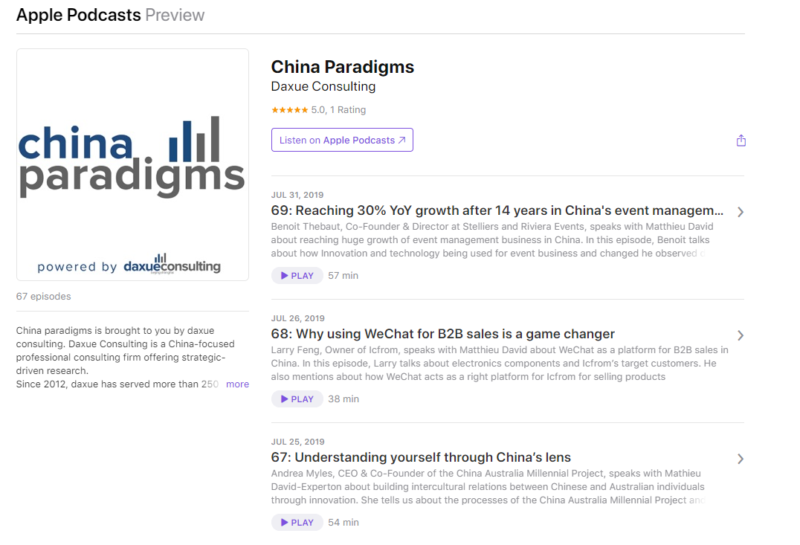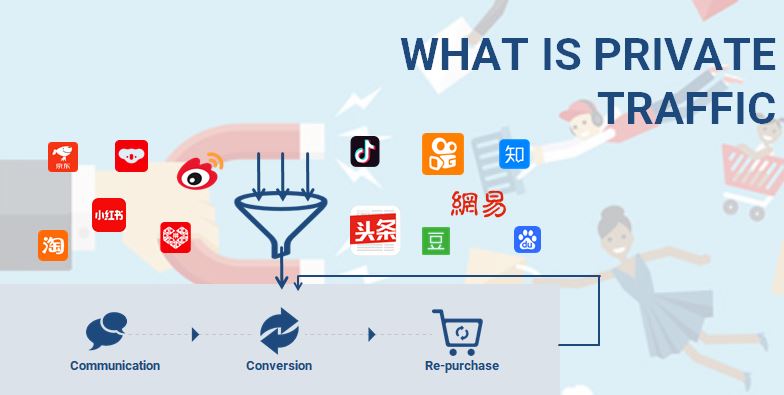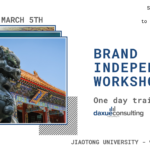Private Traffic in China: Own your customer traffic
Private traffic, known as 私域流量 in Chinese, is a trending term among China marketers in 2019 and 2020. Private traffic is a marketing method where communication with customers is funneled into private pools on platforms that allow brands to have full control without costs of third-party platforms. This way, brands can systematically reach users at little cost. The opposite of private traffic in China would be communication with consumers through e-commerce platforms like Tmall, Taobao, and JD, where the platforms own traffic data and have more control over how the brand is perceived.
With the increasingly intense competition in e-commerce in the Chinese B2C market, customer acquisition cost will be higher. So, marketers are exploring new cost-effective methods like private traffic. This article will help you learn about private traffic in China and how to establish your own private traffic pool.
The Recent Development of Private Traffic
Private traffic is frequently discussed in the context of social e-commerce platforms’ popularity. Monetizing of public traffic pools becomes difficult in the competitive e-commerce environment. So, many companies now dig more value from regular customers and target them using private traffic. Also, private traffic is valuable to consumers because it gives them intimacy with the brand.
The trend of Private traffic in China

[Source: daxue consulting, “Searches of private traffic in 2019”]
Based on searches of ‘Private Traffic’ on Baidu, we can see the trend took off in early summer 2019. Four times higher search index on Baidu shows that “private traffic” showed up more in Chinese marketers and consumers daily life. With several successful examples emerging in the market, more people want to learn how they can leverage private traffic.
Consumer willingness to join private traffic pools in China
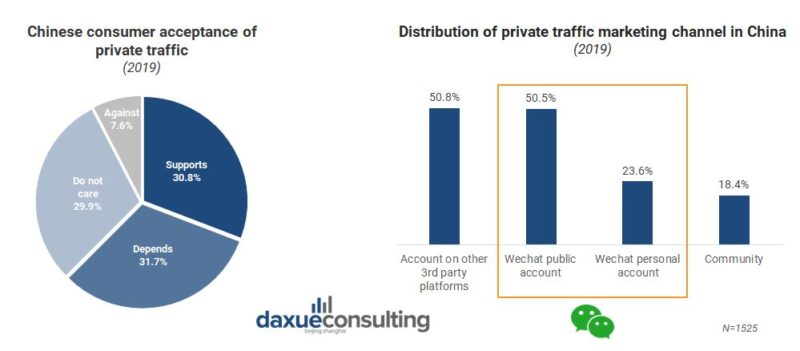
[Data source: iiMedia, “Acceptance level and distribution of private traffic in China”]
Private traffic depends on consumer willingness to join private traffic pools and interact with brands. The data from iiMedia Research illustrates that 30.8% of the respondents indicate they support private traffic operations, 61.6% of the respondents are relatively neutral and only 7.6% of the respondents express their dislikes. Analysts reckon that the high acceptance of private traffic is due to online marketing in China becoming more common. On the one hand, it is difficult for netizens to avoid being marketed. On the other hand, content marketing solves the pain point of users’ information asymmetry and brings value to them.
Private traffic explained
Private traffic refers to the traffic which can be fully managed by the brand, without relying on any third party or paid channels. It is free from the algorithms of large ecommerce platforms like Tmall and JD, putting the brand in control of how consumers see their products.
Differences between public and private traffic
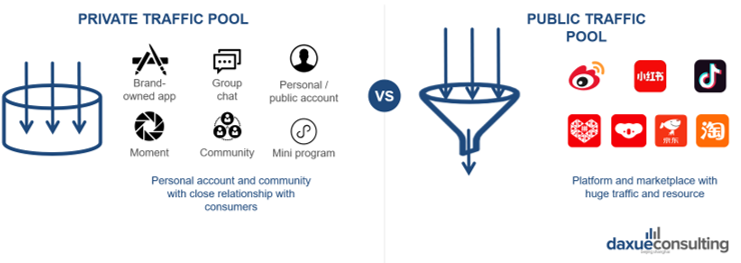
[Source: daxue consulting, “Differences between public and private traffic”]
Private traffic helps brands contact consumers directly and improve consumer retention rate. Brands can focus purely on target consumer groups while saving money on acquiring traffic.
In contrast, public traffic in China highly relies on platforms and external channels, so it normally requires high cost on getting traffic and makes brands have less control over the traffic. Despite these channels can help the brand reach a wide range of consumers, it’s still hard for brand to achieve customer retention.
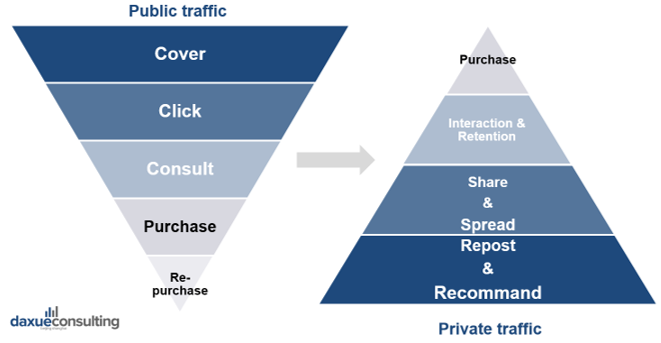
[Source: daxue consulting, “Daxue consulting private traffic in China – Different logics of public and private traffic”]
In addition, compared with public traffic in China, private traffic allows brands to reach customers with good continuity. Shopping assistants and Key Opinion Consumers (KOCs) can provide one-on-one service for customers. By offering product-related expertise knowledge and useful information, it is easier for brands to build trust among consumers. After the trust continues to deepen, consumer shopping behavior will extend from individuals to families and friends. Hence, the private traffic will become fission marketing and generate a positive circulation. So, the conversion and repurchase rate on self-owned channels are naturally higher than that on Chinese B2C E-commerce platforms.
Why is Private Traffic So Attractive?
Establishing a private traffic pool can help a brand reach customers easier at a lower cost, as compared with Chinese B2C E-commerce platforms. There are mainly three advantages that a brand can take as below:
More cost-effective
Like owned traffic in the West, private traffic is a direct response to the rising costs of reaching fans and followers.
The customer acquisition cost of Taobao in 2013 was 30 yuan per person, and by 2017 it had risen to 250 RMB. During the 11.11 promotion, some brands ’public traffic procurement costs 20% -30% of total revenue. Merchants have to buy traffic during each event, but the distribution of traffic on the Chinese B2C E-commerce platforms is unbalanced according to the reported that 80% of Taobao’s traffic is given to the top 20 merchants.
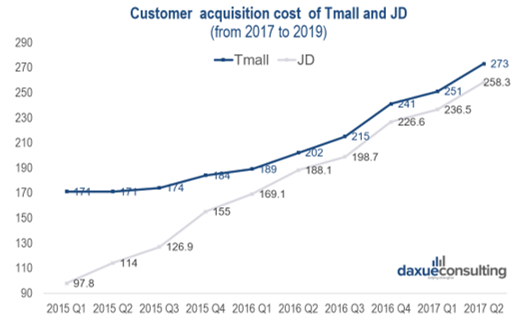
[Data source: Analysys, “Customer acquisition cost of Tmall and JD”]
Based on data from Analysys, customer acquisition cost of Tmall increased by 60% from 2015 to 2017 while JD increased by 164% during the same period, both of them exceeded 250 RMB. However, customer acquisition cost of private traffic is much lower. For example, Perfect Diary can attract consumers enter its private traffic pool with only 2-3 yuan for each.
Improving brand image and conversion rate
In the public traffic pool, the brand can hardly rebuild connection with users, who once purchase its products. However, by having its private traffic pool, the brand can develop closer relationship with customers. Also, it can help to improve brand image through the word-of-mouth promotion from regular customers to new ones in customers’ community. This kind of behavior will have a superimposed effect, which is much more effective than common promotion method.
Getting closer to customers
Before introducing new products, companies need to do a wide range of market research to meet market demands. With the private traffic pool, companies can collect needs and feedback from consumers directly. Private traffic can effectively reduce churn rate, especially when the brand interacts with customers in a more human-like and personalized manner. By operating private traffic pool and establishing emotional interaction with users, the products recommendation will not be blocked as annoying advertisings, but accepted easily by consumers.
How Private Traffic Work
Traffic flow in Private Traffic
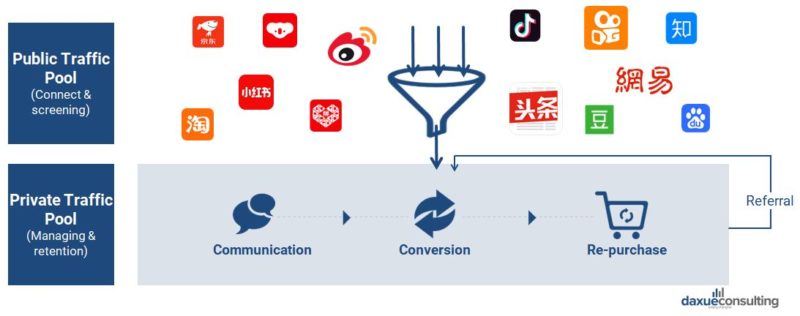
[Source: daxue consulting, “Daxue consulting-private traffic in China – General logic of private traffic in China”]
Directing traffic to a private traffic pool is based on five steps: acquisition, activation, retention, revenue and referral.
A brand funnels traffic from public pools (like e-commerce marketplace platforms) to private pools through attractive content, QR codes, and consumer benefits. Then it operates its private traffic to awaken silent customers, improve customer stickiness, retention and repurchase rate.
Three models of operating private traffic in China
There are three main models of operating private traffic. First, the shopping assistant model is suitable for new brands. The professional model, or Topic Expert model, is focused on educating consumers. The private partner model is usually suitable for luxury goods or education and fitness industries

[Source: daxue consulting, “Daxue consulting – Models of private traffic in China”]
Model 1:Shopping assistant
The shopping assistant model is suitable for new brands. It is a one-to-many relationship which helps early users understand the brand. Brands leverage social media platforms to share products’ using experience and promotions with consumers in the private traffic pool. This model meets customers’ demands of acquiring rich information conveniently and special benefits. This model can be compared to a retail associate in a department store.
Similar to how Watsons’s shop assistants provide services for consumers in store, such as skin tests and makeup trials. In the shopping assistant private traffic model, customers can add shop assistant’s WeChat account, thus they can have after-sale services, personalized service and information of new arrivals.
Model 2:Topic expert
Topic expert is suitable for targeting consumer groups in the professional or lifestyle categories. A brand with core cohesion, such as Nike, gathers fans to establish an interest community, organizes offline activities like running, yoga and so on. It can attract individuals, who need sense of belonging and relevant knowledge and improve customer’s stickiness. In the case of Nike, the topic expert would be like your fitness-obsessed friend, who can tell you what shoes to buy for running vs. basketball, and what to bring to your first Yoga experience.
Model 3:Private partner
Private partner model is usually suitable for luxury goods or education and fitness industries, whose customers need valuable and personalized services. Many educational institutions adapt this model to manage users hierarchically by one-to-one services. They usually organize offline events instead of pulling customers to their community directly. The private partner is like the digital version of an advisor or consultant, who can provide personal guidance and exclusive advice.
How to establish private traffic ecosystem on WeChat?
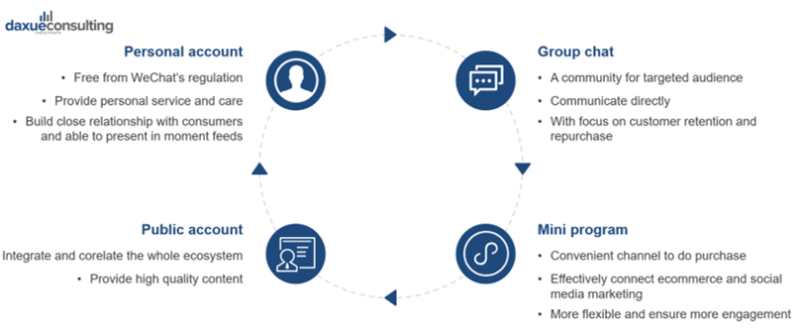
[Source: daxue consulting, “WeChat ecosystem of private traffic in China”]
First, create a personal account on a platform like WeChat to interact with customers and provide personalized services. Second, share high quality content on WeChat moments to promote content and gather interest in your brand. Third, drive public traffic for brand-owned sales channels such as mini-program to effectively connect ecommerce and social media marketing. Finally, integrate and correlate the whole ecosystem through public account, which can provide entrance to its mini-program on its homepage and posts to complicate the traffic circulation.
If you want to learn more details from operating private traffic cases in China, you can read our case study about Perfect Diary, a Chinese cosmetics brand that has grown 50-fold through a private traffic strategy. Because platforms like Taobao and JD are becoming more expensive, now is the time for brand to gain independence from these platforms by establishing private traffic in China. If you want to know how to get brand independence in China, email our project team at dx@daxueconsulting.com to start your China market strategy project.
Let China Paradigm have a positive impact on your business!
Listen to China Paradigm on iTunes
